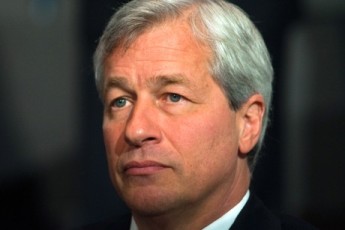On Sunday morning’s Meet the Press, JPMorgan Chase CEO Jamie Dimon declared, “We were dead wrong,” with respect to a $2 billion (possibly $1 billion more) loss by the largest U.S. banking firm.

Last month, with the loss in the rumor mill, Dimon called it a “complete tempest in a teapot.”
Does anyone remember Enron, WorldCom, BP, Goldman Sachs, G.E., Merck, Lehman Brothers, Walmart? Accounting fraud, tax evasion, bid rigging, overbilling, bribery.
Granted, what Chase did was not illegal. They had sufficient capital assets to cover their losses, but what happens with the next risky bet?
“Every big bank has risk controls,” writes Peter Eavis and Susanne Craig for the NY Times (May 12). “Teams of executives are assigned to manage and review trades to ensure the bank’s safety and health. Yet trading debacles happen with surprising regularity.
“MF Global went out of business after making an ill-timed bet on European debt. Before that, a UBS trader in London lost the firm $2.3 billion. The 2008 financial crisis was the result of major risk miscalculations that brought down several big financial institutions, including Bear Stearns, Lehman Brothers and the American International Group. Now, JPMorgan Chase faces its own mess.”
The question is: When will Chase’s mess become the country’s mess?
The problem that I have with CEOs like Dimon is not their capitalist mentality. I’m all for capitalism. I’m concerned, however, with CEOs like Dimon who engage in strong anti-regulatory talk on one hand while characterizing a $2 billion loss as “egregious,” “sloppy” and “dead wrong,” absent any indication that he’s learned the very hard and real lessons of the recent past.
“In the aftermath of the financial crisis,” the Times writes, “big banks said they had learned their lessons. Financial executives claimed they had tempered the risk on their balance sheets and pulled back from making large bets with their own money, even before regulators devised new rules to stop proprietary trading at government-backed banks.”
In a 2011 note to Chase shareholders, Dimon wrote, “In a risk-taking business, it is easy to generate increasingly better results in the short run by taking on excessive risk or by building lower-quality business — but you will pay for that in the long run.”
Dimon appears to have ignored his own advice. While I appreciate his owning up to the sins of Chase, if I were a shareholder, these are the questions that I’d want Dimon to answer:
Why should we continue to trust a CEO charged with oversight who admits to “egregious,”“sloppy,” “stupid” mistakes? More importantly, what processes are you going to put in place to insure that they don’t happen again?
Anyone remember this exchange between Treasury Secretary Hank Paulson and his Chief of Staff, Jim Wilkinson from Andrew Ross Sorkin’s Too Big to Fail:
Paulson: The Fed can lend to non banks under unusual and exigent circumstances, we’re thinking of taking over 80% of [AIG].
Wilkinson: Hank we can’t! This morning we were lecturing the entire country on moral hazard.
Paulson: AIG has collateral, they have assets, Lehman didn’t, we couldn’t lend into a hole, it’s not the same story!
Wilkinson: Nobody is going to care, it’s another bailout, with no legislation, the Hill is gonna go crazy, the country is gonna go crazy.
Paulson: The plane we flew in on this morning leased from AIG, construction downtown AIG, life insurance 81 million policies with a face value of $1.9 trillion. Billions of dollars in teachers’ pensions. You want ‘too big to fail’ here it is!
Of course, conservative Op-Eds in The Wall Street Journalwere burning pixels highlighting the “ambiguity of the Volker Rule” and the lack of anything meaningful in Dodd-Frank, the legislation that is supposed to reign in the excesses of Wall Street.
“That the rules are not in place, two years after the passage of Dodd-Frank,” writes NY Times business writer Joe Nocera(May 11), “is partly a function of their complexity, and partly a function of fierce lobbying by the banks – led by JPMorgan – to water them down.”
On This Week (May 13) with George Stephanopoulos, former New York Governor Eliot Spitzer, who, as New York’s attorney general saw more than his share of illegal excess on Wall Street said, “…Chase has a federal guarantee behind it. They can borrow cheap, bet big. If they lose, we come in and we bail them out. The problem is this is not capitalism. I’m a capitalist. A capitalist says you have to be small enough to absorb your own losses. You have to be smart enough to take your own risks and measure them. They do neither. These institutions should be broken up.”
“ ‘There is no safe way to getting risk management right because by its very nature risk is risk,’ said one senior Wall Street executive who spoke on the condition of anonymity because he was prohibited from speaking publicly about the matter. ‘The issue is how you manage it, and you need a strong aversion to directional bets and big bets.’ ”
Before the Chase scenario repeats itself, Dimon needs a lot more intelligent decision-making, and at the top of that list I would put: HUMILITY. As the head and current face of the banking industry, he has a responsibility to do more than own up to “sloppy… stupid” mistakes. The pursuit of excellence carries an ethical dimension when others rely on an individual’s knowledge, skill and willingness to perform their jobs effectively. An important aspect of excellence is self-restraint – the ability to maintain discipline and self-control, making decisions that take into account and advance long term interests.
To be part of an economy that is still both recovering and fragile, a leader needs the requisite wisdom and humility to be able to apply recent history to current decision-making.
If Mr. Dimon is unwilling to wake up and smell the ethical and economic reality of “Too Big to Fail,” the people and Congress should break-up institutions like Chase.
Comments









